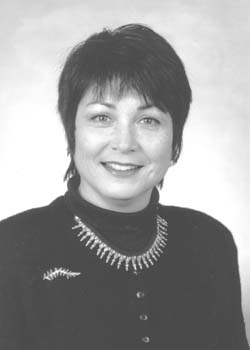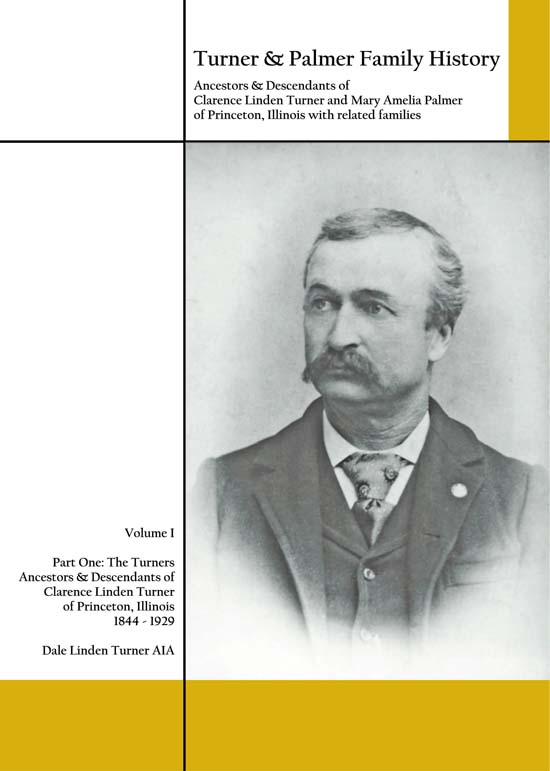| | Published March 18th, 2009
| Quest for Stories Leads Local Resident to Uncover the Past
| | By Jennifer Wake |  | | Dale Turner Photos provided
|
Most people might define genealogy as a detailed family tree. For Lafayette architect Dale Turner, however, it is much more; genealogy is about the stories those ancestors tell.
 In 1977, after Turner's grandfather died, she heard that there was a Turner genealogy. When she asked to see it, her father replied, "It's in a box somewhere; I'll look for it." Ten years later - after continually asking her father, aunts and uncles about the document - Turner was shown a bound copy chronicling a long list of descendents, with birthdates and names, but no cities where they were born - and it wasn't even from the Turner-side of the family.
In 1977, after Turner's grandfather died, she heard that there was a Turner genealogy. When she asked to see it, her father replied, "It's in a box somewhere; I'll look for it." Ten years later - after continually asking her father, aunts and uncles about the document - Turner was shown a bound copy chronicling a long list of descendents, with birthdates and names, but no cities where they were born - and it wasn't even from the Turner-side of the family.
 Thus began her quest for the Turner clan, which has led her to sleepy towns in Vermont, grassy graveyards in Illinois, message boards on the Internet, and one-on-one conversations with great aunts, and distant cousins.
Thus began her quest for the Turner clan, which has led her to sleepy towns in Vermont, grassy graveyards in Illinois, message boards on the Internet, and one-on-one conversations with great aunts, and distant cousins.
 Through the course of her research over the past 20 years, Turner has found gems such as a land grant signed by Ulysses S. Grant, items purchased at the Chicago World's Fair, and even documents from the Civil War. "Most people's genealogies are just a list of names," Turner said. "The stories are what make them interesting."
Through the course of her research over the past 20 years, Turner has found gems such as a land grant signed by Ulysses S. Grant, items purchased at the Chicago World's Fair, and even documents from the Civil War. "Most people's genealogies are just a list of names," Turner said. "The stories are what make them interesting."
 For example, Turner's mother was a war bride and came to the United States by herself at the age of 17, crossing the seas on a ship from the Philippines to San Francisco, before boarding a train alone to the Midwest.
For example, Turner's mother was a war bride and came to the United States by herself at the age of 17, crossing the seas on a ship from the Philippines to San Francisco, before boarding a train alone to the Midwest.
 "I have the first letter she sent home telling about the trip and how terrible it was, being seasick for two weeks," Turner said.
"I have the first letter she sent home telling about the trip and how terrible it was, being seasick for two weeks," Turner said.
 Turner visited relatives in Illinois, and came home with a box filled with photographs and old documents. The result of her efforts is a 627-page volume (the first of ten) that includes relative's stories, photographs, census information and even historic facts from different periods, such as the use of the rotary dial phone. Turner even found a patent of her great-great-grandmother's, who liked to invent things, and included a picture of the invention (a contraption used to lift long skirts out of the mud).
Turner visited relatives in Illinois, and came home with a box filled with photographs and old documents. The result of her efforts is a 627-page volume (the first of ten) that includes relative's stories, photographs, census information and even historic facts from different periods, such as the use of the rotary dial phone. Turner even found a patent of her great-great-grandmother's, who liked to invent things, and included a picture of the invention (a contraption used to lift long skirts out of the mud).
 Turner started her research before she had a computer or Internet access, and described spending countless hours scanning microfilm page by page, taking handwritten notes, and culling through 50th wedding anniversary announcements or obituaries.
Turner started her research before she had a computer or Internet access, and described spending countless hours scanning microfilm page by page, taking handwritten notes, and culling through 50th wedding anniversary announcements or obituaries.
 "Everything has changed with computers, the Internet, scanners and digital cameras," she said. "It is easier to obtain information through genealogy Web sites and even through Google. If I had access to the Internet in 1988, what took me 20 years to discover could have been found within a few."
"Everything has changed with computers, the Internet, scanners and digital cameras," she said. "It is easier to obtain information through genealogy Web sites and even through Google. If I had access to the Internet in 1988, what took me 20 years to discover could have been found within a few."
 For novice genealogists, Turner recommends watching instructional videos on the New England Historical and Genealogy Society Web site (www.newenglandancestors.org/services/30.asp/), or reading "getting started" guides on sites like Ancestry.com (http://learn.ancestry.com/home/hmind.aspx) and Family Search Resources (www.familysearch.org/
For novice genealogists, Turner recommends watching instructional videos on the New England Historical and Genealogy Society Web site (www.newenglandancestors.org/services/30.asp/), or reading "getting started" guides on sites like Ancestry.com (http://learn.ancestry.com/home/hmind.aspx) and Family Search Resources (www.familysearch.org/
 eng/Home/Welcome/
eng/Home/Welcome/
 frameset_information.asp.
frameset_information.asp.
 She has also found great information from genealogy message boards, which are organized by surnames, locality, and topic. "I most enjoy getting stories and sharing photos with living relatives, both in my immediate extended family and also very distant relatives, some of whom I've 'met' on message boards."
She has also found great information from genealogy message boards, which are organized by surnames, locality, and topic. "I most enjoy getting stories and sharing photos with living relatives, both in my immediate extended family and also very distant relatives, some of whom I've 'met' on message boards."
 One challenge, says Turner, is getting people to talk about themselves.
One challenge, says Turner, is getting people to talk about themselves.
 "A lot of people are shy about telling their story," she said. "People don't like to talk about themselves and think they have to send a great literary work. If they're too shy, I ask them to tell me about someone, or ask one question at a time. I asked my dad, 'Tell me about the war?' Then he got all excited."
"A lot of people are shy about telling their story," she said. "People don't like to talk about themselves and think they have to send a great literary work. If they're too shy, I ask them to tell me about someone, or ask one question at a time. I asked my dad, 'Tell me about the war?' Then he got all excited."
 In her book, Turner quoted a great aunt as saying, "Getting people to talk about themselves is like pulling hen's teeth."
In her book, Turner quoted a great aunt as saying, "Getting people to talk about themselves is like pulling hen's teeth."
 Turner recently spoke to her local Rotary club about her genealogy research. Her talk, entitled "Genealogy: Get 'Em While They're Hot," focused on asking your family questions while they are still around.
Turner recently spoke to her local Rotary club about her genealogy research. Her talk, entitled "Genealogy: Get 'Em While They're Hot," focused on asking your family questions while they are still around.
 "See these four people listed as sources?" Turner said, pointing to a page in her book. "They're all gone, now."
"See these four people listed as sources?" Turner said, pointing to a page in her book. "They're all gone, now."

|
 | | Photos provided
| | | | | | | Advertisement | | |
| | | | | | Comments | | | | | | | | | | | | | | | Subscribe / Unsubscribe | | | | | |
| | | | | |  | | |
| | |  | | |
| | | | | |

